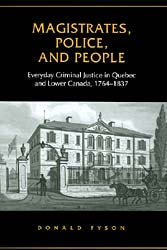by Donald Fyson, Professor of History, Universite Laval. Published with the University of Toronto Press, 2006.
This book is a study of everyday criminal justice in Quebec and Lower Canada between the Conquest and the Rebellions, concentrating on the justices of the peace and the police. The first half explores the criminal justice system itself: the transfer and adaptation of English criminal law and courts, the appointment and character of the magistracy, and the police. The second half presents an overview of everyday criminal justice in operation. Prof. Fyson argues that neither the Conquest nor the Rebellions represented radical breaks with the past. There was considerable continuity despite the Conquest, both in structures and in personnel. Conversely, state formation was well underway before the Rebellions, responding to the demographic, social and economic changes that swept the colony. Criminal law and the criminal justice system were modified to suit local circumstances, and the magistracy and the police, became increasingly professionalized. The relationship between the people and the system also changed dramatically across the period. This is perhaps best exemplified by the steady increase in the rate of criminal prosecution. From being relatively marginal, local criminal justice became increasingly used by both the Canadien and British populations of the colony, especially in urban areas.
Don Fyson’s award winning book has now been translated into French, the second Osgoode Society book published in French. It came out with Hurtubise in 2010, part of that publisher’s Cahiers du Quebec series.


